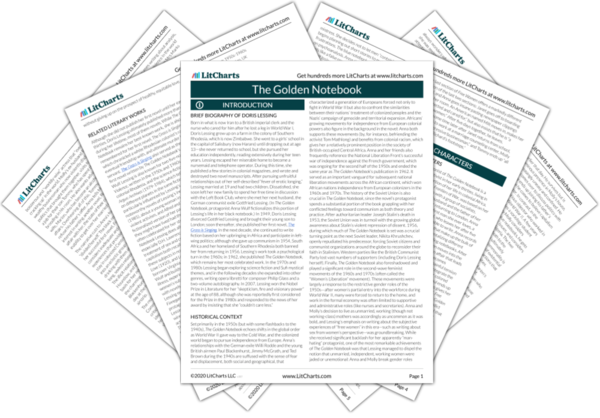Anna’s blue notebook records her conversations with her psychoanalyst, Mrs Marks, which largely focus on Anna’s peculiar dreams. Whereas she feels emotionally blunted in real life, Anna notes that “all my creativity is going into my dreams”; in dreams, she experiences a tremendous depth of feeling, and they become her main source of insight into her fears, suffering, and emotional needs. Anna’s dreams contain their own individual significance as well. Her first dream is about failing to perform, which represents her “lack of feeling”; the next few dreams represent “false art,” which reflects her fear that her writing does not adequately represent the truth of her experience. Mrs Marks’s ability to dictate when Anna stops and starts dreaming, as well as her eventual appearance as a benevolent figure in Anna’s dreams, represents her powerful (if underappreciated) role in helping Anna restore her creativity by processing her emotions, moving them from the unconscious to the conscious mind.
Anna’s most important dreams are her nightmare about “joy in spite,” and those about Saul as the projectionist replaying her memories in the golden notebook; both of these dreams represent her struggle to overcome contradictions, not necessarily by resolving them to one side or the other (picking joy or spite, herself or Saul as the true driving force of her identity) but rather by holding both sides of the contradiction in herself at once. Mrs Marks teaches Anna to dream the “joy in spite” dream “positively,” and to awake “filled with joy and peace.” The projectionist dreams allow Anna to see her plurality of perspectives on her life and the world, which begin to meld into words on a page that represent her ultimate achievement in the novel: the creative energy to write Free Women. Throughout the novel, Anna’s dreams (much like the golden notebook) integrate the divisions Anna creates for herself in her life, incorporating material from her four notebooks and offering her the self-knowledge (and sometimes foresight) that she can only gain when she unconsciously sees herself as whole rather than fragmented.
Anna’s Dreams Quotes in The Golden Notebook
Literature is analysis after the event.
Still asleep, I read the words off a page I had written: That was about courage, but not the sort of courage I have ever understood. It's a small painful sort of courage which is at the root of every life, because injustice and cruelty is at the root of life. And the reason why I have only given my attention to the heroic or the beautiful or the intelligent is because I won't accept that injustice and the cruelty and so won't accept the small endurance that is bigger than anything.












